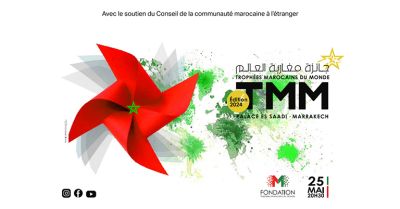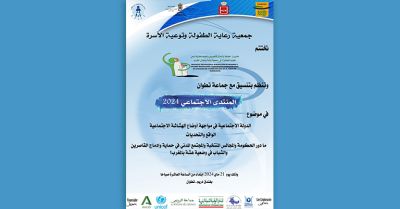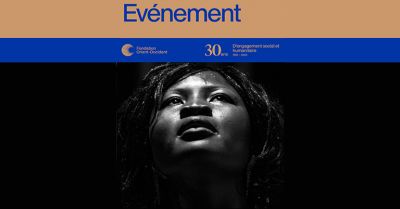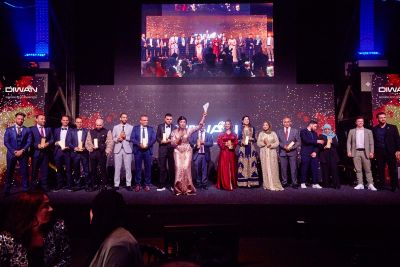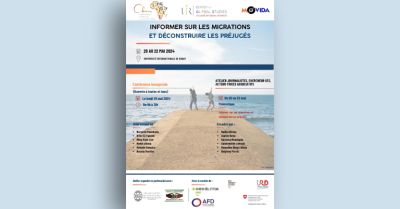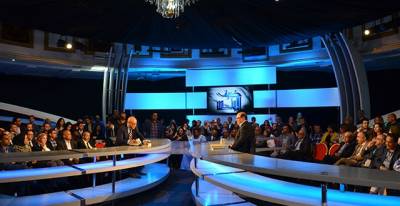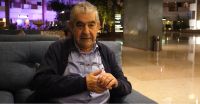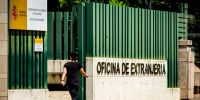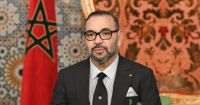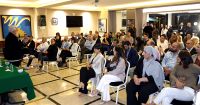Marrakech: the Moroccans of the World Trophies hold their 6th edition
The sixth edition of the Trophées Marocains du Monde (TMM), organized in partnership with the Council of the Moroccan Community Abroad (CCME), will be held from May 23 to 26 in Marrakech, and will feature the presence of eminent figures from the Moroccan diaspora from a variety of spheres.
Tetouan: a forum explores ways of protecting and integrating minors
A forum exploring means of protecting and integrating Moroccan and migrant minors was held on Tuesday 21 May 2024 in Tetouan, initiated by the Child Protection and Family Awareness Association (APIASF), in cooperation with the municipality of Tetouan.
The CCME president takes part in the 30th anniversary of the Fondation Orient-Occident
The President of the Council for the Moroccan Community Abroad (CCME), Mr Driss El Yazami, will be taking part in the 30th anniversary of the Orient-Occident Foundation in Rabat on Thursday 23 May 2024. The Foundation is a Moroccan non-profit organization founded in 1994 and granted public interest status in 1996.
Moroccan skills in Belgium rewarded at the Diwan Awards
On Saturday 18 May 2024 in Brussels, several Moroccan-Belgian professionals who have distinguished themselves in various areas were honoured at the 11th Diwan Awards, organised in partnership with the Council for the Moroccan Community Abroad (CCME) to reward the excellence of Moroccan-Belgian professionals.
Mr Driss El Yazami attends the UIR inaugural conference
The Movida LMI and the Center for Global Studies at Rabat International University (UIR) are organising a workshop from 20 to 22 May 2024, in partnership with the Collectif des communautés subsahariennes au Maroc (CCSM) and the Réseau Marocain des journalistes des Migrations (RMJM), on how to provide information on migration and deconstruct prejudices and preconceptions.
This edition of the International Book and Publishing Fair (SIEL) is being held in a unique and unprecedented context. It will be the first event of international scope hosted by our country after a two-year suspension due to the repercussions of the Covid-19 pandemic, with a large influx of Moroccan and foreign visitors. This is a fine way to celebrate the Kingdom's inspiring success, under the wise leadership of His Majesty King Mohammed VI, in overcoming the most perilous undertakings to breathe new life into Moroccan cultural and intellectual life, this time from Rabat, the city of light, the capital of culture in the Islamic world and the cultural capital of Africa, which qualifies it, exceptionally, to host the continent's biggest cultural event this year.
The Council of the Moroccan Community Abroad (CCME) has chosen to focus its participation in the current edition of the SIEL on the theme "Africa in the eyes of its communities", with the aim of placing the issue of African migration at the centre of the societal debate and the cultural and intellectual current affairs of this global event, which this year has chosen Africa as its guest of honour.
Africa is one of the priority themes for the CCME, which had decided, due to the anchoring of the African tributary in the Moroccan identity, to dedicate its participation in the 2014 SIEL to Africa, being a continent at the source of human mobility. In addition to the achievements of the different works undertaken in this sense, the council intends to deepen the debate on the contemporary challenges of African migration, particularly in Europe, in the context of the profound political and cultural changes that are taking place in its societies, where the migration issue, in this case African, is becoming a major issue, the pivot of political conflicts and electoral programmes.
The debates on immigration in Europe in recent years reflect the dominance of nationalism due to the rise of extreme right-wing waves and the revival of conservative ideological theories that reject pluralism and advocate introversion as a way of life, making people believe that immigrants are a threat to the existence and culture of European societies based on misleading arguments and erroneous data that have been disproved by all the official statistics of international institutions.
Migration is an ancient phenomenon, but its treatment is currently being unjustifiably amplified. If we stick to the real facts, migrants constitute only 3.5% of the world's population, so 96% of them live in the countries where they were born. Moreover, African migrants represent only 14% of the world's migrants, a much smaller proportion than European (24%) and Asian (41%) migration, bearing in mind that more than 60% of migration in the continent is intra-African. Thus, adopting an objective and scientific approach to the treatment of African migration, whether in elections or in media debates, is one of the greatest challenges to be overcome.
On the other hand, an accurate understanding of the migration phenomenon requires a deeper understanding of several related changes. The structure of migration has undergone a radical transformation in terms of composition, since it is no longer undertaken solely by a labour force of workers with a view to returning to their countries of origin, but has become a rooted migration that has produced intellectual and scientific elites who have risen to high ranks in their fields of competence. This intelligentsia then expresses expectations that go beyond the thresholds of the first generations, their social interaction is no longer limited to migrant or worker services in the host countries but extends to state institutions as they enjoy full citizenship and hold two or more nationalities. More than that, these elites have become capable of developing visions and theories that question the intellectual and philosophical structures of the state and society.
Thus, addressing the issue of African immigration cannot be done in isolation from the issue of our time, that of the international race to attract highly qualified talent in such advanced fields as health, engineering, agriculture and modern technology. This is one of the modern and complex issues that are widening the gap between developed and developing countries, which are threatened with losing their skills due to the temptations and opportunities.
Therefore, addressing the issue of African immigration cannot be done in isolation from the issue of our time, that of the international race to attract highly skilled talent in cutting-edge fields such as health, engineering, agriculture and modern technologies. This is one of the modern and complex issues that are widening the gap between developed and developing countries, which are threatened with losing their skills due to the temptations and opportunities for professional and financial advancement offered by the countries of the North.
Finally, the Covid-19 pandemic has also had a profound impact on the world of migration. For the first time in contemporary history, the movement of people is confronted with closure measures in all continents, as almost every country in the world has imposed a general quarantine. Immigrants in Europe have lived through a most difficult period as they represent one of the vulnerable fragile groups, but these extremely difficult conditions have above all been an opportunity for them to assert their added value and to affirm that all the components of a plural society contribute, each thanks to their uniqueness, to the destiny of humanity. Immigrant communities working in vital sectors have found themselves in the forefront of providing basic services to the community of residence, and supporting materially and morally their family members in the countries of origin, through financial transfers and intercontinental civil initiatives.
These transformations and contractions experienced by the immigrant community, including the Moroccan community and all African communities, must be apprehended according to a global, scientific and objective approach in order to understand the contemporary migratory reality from all its angles and to anticipate responses to the issues and challenges of the future. Above all, it will be necessary to measure the cultural and intellectual wealth that African migration has produced and to value the contribution of African migrants to development, whether in the host countries or in the countries of origin. The ultimate goal is to develop a unified vision involving all civil actors of African migration in order to succeed in the process of integration and coexistence and to change the reductionist mentalities of certain groups in Western societies.
To this end, the stand of the Council of the Moroccan Community Abroad offers a rich and diverse intellectual and cultural programme on various aspects of African migration at the Rabat International Book and Publishing Fair, while presenting an important set of recent publications of the Council on several migration-related topics. The program is not limited to the stand area but extends to cultural and intellectual activities in other areas, in partnership with academic institutions and civic organisations, to make our participation in this year's edition a unique contribution to the influence of Rabat, capital of lights.
Abdellah BOUSSOUF
Secretary General of CCME
The CCME’s presence and participation at the Casablanca International book & Edition Exhibition (SIEL) has become a must.
During prior editions of this cultural event, the Council’s participation was underlined by an in-depth thought process about the reality of Moroccan immigration in Western society. We have attempted to break down the essence of the actual challenge arising from living together in a diverse society as well as the opportunities that arise from it. We also opened the debate around the complexity of identity related tensions within host countries and included multiple key stakeholders, including institutions, into the discussions. The output consisted of both answers and actual proposals. The study of Moroccan immigration’s characteristics has allowed to conclude that a successful integration within the various host countries is primarily enabled by a plural Moroccan identity that allows co-existing alongside any culture. A study of those who carry these values becomes a vehicle to openness and cultural enrichment for the host country which in turn shares its culture and expertise. This exchange process consolidates the consecration of universal values and actively contributes to the development of both host and native countries. For the CCME, this 25th edition of the SIEL, dedicated to the presence of Moroccan culture beyond borders, rediscovers its components and richness, will be an opportunity to deepen the knowledge of its assets and the challenges it faces. To achieve that we will attempt to provide Moroccans across the globe with tools likely to contribute to the development of the host societies and at the same time allow the Moroccan culture to leverage globalisation for the benefit of future generations. Moroccan designers and artists worldwide have the ability to uphold the Moroccan culture on the international scenery through their creations.The CCME’s agenda merely reflects the richness and diversity of Moroccan creations around the globe. We are pleased to welcome visitors of the SIEL to the CCME booth to exchange, interact and share our immigration related experiences.
Abdellah Boussouf
The poorer countries of the world are the ones that host the highest number of refugees. It is a fact reported by Amnesty International on October 6 2016 in a report stating that 10 countries with the lowest GDP (less than 2.5%), host 56% of the world's refugees.
However, it is in rich countries like France, Germany, Great Britain, Denmark, Austria and newcomers in the EU, like Poland, Hungary, and Austria, that the, anti-muslim immigration movements have seen the highest growth.
Anti-immigration movements have reached an unprecedented scale with the refugee "crisis" from countries devastated by civil wars. The racist speech is liberated, in a European Union, which was created precisely to avoid ever being confronted again with institutionalized racism after World War II.
Democratic conservative parties are gradually giving more room to their « right wings », which have close ties to xenophobic movements. Left-winged political parties aren't left out in this matter. They perceive the Muslim immigration as a "concern", if not "a problem".
A former president of Reporters Without Borders (RSF), who for over a decade professed democracy and freedom of speech for countries in democratic transition was elected mayor in the French town of Béziers. Today he plays on the fear and hatred of Muslim immigrants; creates private militias which were later dismantled by law; announces a referendum in January 2017 (election year in France) in order not to host any migrants, as illustrated by racist posters, whilst this city is only required to create 40 additional places for migrants. The latter largely come from Calais -following its dismantling- in a shelter run by an ecumenical NGO, better known as the "Cimade" ... This can only raise questions. Because this is France, the country of "liberty, equality and fraternity."
When Germany, where the far right seemed to be forever annihilated after the Second World War, is faced with Pegida -which recently celebrated its second anniversary. This movement arose after the refugee 'crisis' and uses the slogan "Muslim migrants are not welcome," it also raises questions. Notably since the awakening of the AFD, the extreme right party, not far from the neo-Nazis, which within a few months managed to defeat the party of German Chancellor Angela Merkel, in her own political bastion… This led to a crisis within the CDU (Christian Democratic Party) and the party to require a firmer policy towards refugees from the German Chancellor.
Germany is the European country hosting most refugees in Europe.
France and Germany, the two pillars of the European Union, are currently facing a new phenomenon in of post-war history: The far right parties have nibbled their way through in such a manner that they eventually mutated into parties which European democracies can no longer ignore, because they are part of the decision-making bodies.
CCME
The Council of the Moroccan Community Living Abroad (CCME) participates this year in the 24th edition of the International Exhibition of Books and Publishing (SIEL) of Casablanca which is held from 8 to 18 February 2018. The CCME, as at of its previous participations, brings together Moroccan writers living abroad, questions the concerns of Moroccan migration and the challenges facing the Moroccan community abroad through round tables and conferences aimed to give adequate answers.
With the political and social changes experienced by the countries hosting the Moroccan community in the last three years, particularly with the rise of extreme right-wing currents, the activism of extremist religious groups and the rise of racist speeches and acts in general and against Islam in particular, issues of identity, religion and culture are fundamental for the members of the Moroccan community living abroad. More than ever, they require a deep and serious thinking to develop a model able to protect the Moroccans living abroad from the consequences of these changes and help their integration into plural societies.
Through our participation this year at the Casablanca Book Fair, which has become an essential cultural event on an international extent, we have the ambition to debate and analyze the criteria of living together in a plural society with the presence of thinkers, intellectuals academics, political, cultural and associative actors from the host countries of the Moroccan diaspora; to highlight the values of pluralism and openness rooted in the Moroccan identity and the wealth of its branch. In fact, values that can lead to adequate answers to the daily lives of Moroccans around the world in the host countries.
We will also have the opportunity to expose aspects of the history of travel and migration of the Moroccan identity in front of a young audience through a special program that combines educational and cultural activities.
Like it’s previous participations to this cultural event, the Council will share it’s scientific experience on Moroccan migration with national institutions and the public. The CCME’s stand will expose the latest scientific publications on different issues of Moroccan migration. As well as the latest literary works of the writers and poets of the diaspora.
- Interview with Mr. Driss El Yazami on migration and cinema
- Rachid Benzine awarded the 2024 Grand Prix du Roman Métis
- Spain to legalize 900.000 undocumented migrants over the next three years
- HM the King Delivers Speech to Nation on Green March 49th Anniversary
- Meeting of the “Maison de la diaspora marocaine” on the theme: “Desire of Morocco vs Desire of the Diaspora”.

